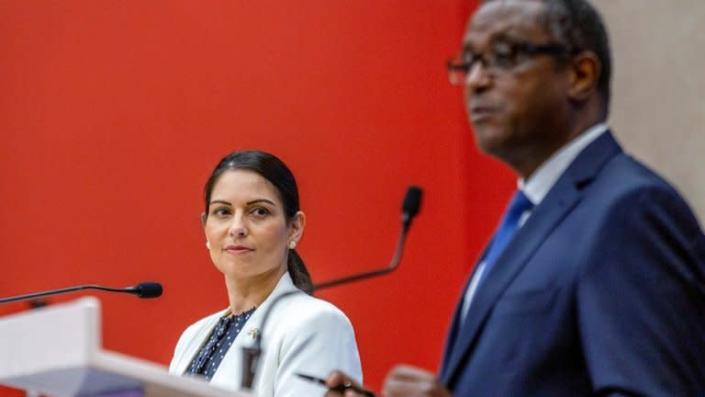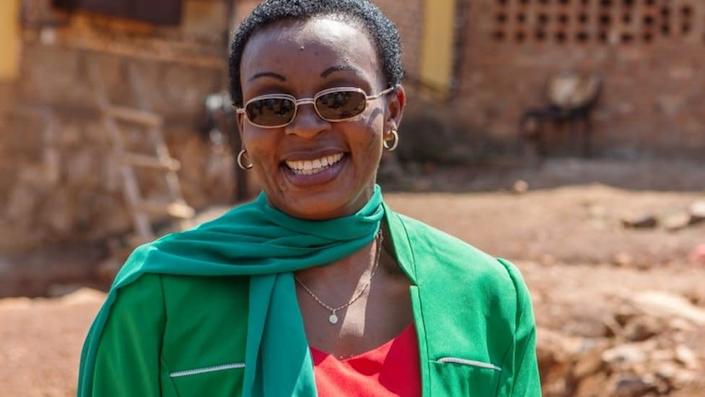With the pink paint on its walls fading, the Rouge by Desir hotel is about a 10-minute drive from the centre of Rwanda’s capital, Kigali.
The six-storey hotel has 72 rooms with views of the hilly city. It is set in a residential area with a mix of stand-alone homes and businesses – and will be one of the places in the city where Rwanda plans to accommodate asylum seekers sent by the UK under a controversial deal between the two governments.
Operations manager Jackie Uwamungu cheerfully shows me around.
“We have VIP, silver, double and twin rooms, a swimming pool and a conference hall,” she said as we went up the stairs.
The rooms are basic with a bed, movable wardrobe, desk and chairs and a small television set mounted on the wall.
The hotel is still taking bookings, but we notice there are very few customers.
Business is just recovering from the long disruptions caused by the Covid-19 pandemic, said Ms Uwamungu.
So the migrants deal is a welcome relief.
“Oh, it will boost our business, honestly,” she admits.
But not all Rwandans are enthusiastic about the deal
Opposition politician and former political prisoner Victoire Ingabire Umuhoza said that before offering to host asylum seekers, Rwanda’s government should focus on solving the political and social issues that make Rwandans seek refuge abroad.


Rwanda’s government has a reputation in human rights circles of being repressive – and has previously been accused of sending hit squads to kill dissents in exile and of demanding loyalty from Rwandans in the diaspora.
UK Prime Minister Boris Johnson has defended his government’s plan to send asylum seekers to the East African country.
“Rwanda has totally transformed over the last few decades, it’s a very, very different country from what it was,” he said recently, although much of the criticism is aimed at President Paul Kagame’s government, has been in power since 1994.
Though it is unclear how many asylum seekers the UK plans to send, Rwanda has also identified 102 rooms at the Hallmark Residence in Kigali’s Nyarugunga suburb.
There are 30 furnished three- and four-bedroom bungalows, with their own gates and gardens.


General manager Nina Gatesi admits she does not know much about the migrant deal and the facility has not yet signed any agreement with the Rwandan government. But she says the residence is eager to provide accommodation.
Other migrants will be hosted at the more basic Hope Hostel, currently under renovation.
The agreement signed by the UK and Rwandan governments for the “asylum partnership arrangement” states that the deal will run for five years from the day it takes effect and may be renewed during the fourth year – though rights groups have vowed to mount a legal challenge against it in the UK to thwart its implementation.
Asked what is in it for Rwanda, government spokeswoman Yolande Makolo says: “Well, what’s in it for all of us who are signatories to the Refugee Convention? We have pledged to protect people who are running away from persecution and have done it in our recent history, over the last almost 30 years now.”
The UK government says it will “invest £120m ($150m) into the economic development and growth of Rwanda” as well as finance “the asylum operations, accommodation and integration similar to the costs incurred in the UK for those services”.
The deal is described by both governments as a “migration and economic development partnership”.


It may be a public relations win for the East African country, but serious concerns continue to be raised about its human rights record.
Campaign group Human Rights Watch has accused the UK government for “overlooking abuses” to justify a “cruel” asylum policy.
Its Central Africa director Lewis Mudge criticised the UK’s safety assessment for Rwanda as “cherry-picking facts, or ignoring them completely, to bolster a forgone conclusion”.
Mr Mudge said the Rwandan authorities used excessive force during protests about food rations by refugees from neighbouring Democratic Republic of Congo in February and March 2018, killing 12 people and arresting 60.
He also said that at least 35 refugees had been sentenced to between three months and 15 years in prison between October 2018 and September 2019.
In one case, Mr Mudge added, a refugee was accused of sharing information with Human Rights Watch and is currently serving a 15-year sentence.
The Rwandan government disputed the allegations and accused Human Rights Watch of having a record of publishing false allegations and fabrications.
Ms Makolo says Rwanda was “doing as well as any other country” in terms of human rights.
It is “work in progress, even in the UK itself [and in the] most advanced countries”, she says, adding that refugees who identify themselves as LGBTQ would be “as free as anyone else” in Rwanda.
In its Rwanda travel advisory, the UK government says homosexuality is not illegal in the country but “remains frowned on by many”.
“LGBT individuals can experience discrimination and abuse, including from local authorities. There are no specific anti-discrimination laws that protect LGBT individuals,” it adds.
Asked whether entering the deal enables the UK government to abdicate its responsibility to refugees under international law, Ms Makolo says the Refugee Convention does not say “they have an unfettered right to choose the country that they go to”.
“So, we see this as a joint responsibility. Rwanda wants to be part of the solution,” she adds.
Rwanda will process the migrants’ claims of asylum and “settle or remove” them in accordance with Rwandan law, the Refugee Convention and international laws, according to the agreement.
Demark is also in talks with Rwanda to strike a similar deal.
A separate migrant deal that saw hundreds of asylum seekers relocated from Libya to Rwanda is run by the UN refugee agency, UNHCR.
They are accommodated at Gashora, a camp about 60km south of the capital.
Close to 1,000 people, most of them originally from the Horn of Africa, have been moved to it since 2019.
According to officials, 626 people have been resettled in third countries, mostly Canada, Sweden, Norway, France and Belgium.
At least five refugees at the camp I spoke to laughed when asked if they would want to settle in an African country, including Rwanda.
Many have endured torture, starvation, extortion by human traffickers, slavery and survived harsh desert conditions or attempts to cross the Mediterranean.
Whilst they all said that Rwanda was a safer and friendlier place to stay, their resolve to eventually live in Europe or North America has far from waned.
There is no record of any migrant ever asking for asylum in Rwanda.




